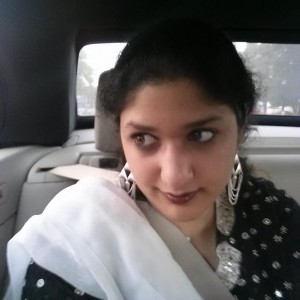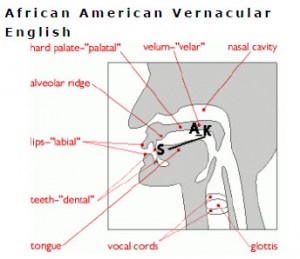Edited to clarify that I, too, was an ignorant asshole once.
In case you weren’t paying attention, George Zimmerman is finally having his day in court. The way things are going with Rachel Jeantel, the witness giving testimony today, it seems almost as though Trayvon Martin and his friends are the ones actually on trial. You can show love for Rachel by tweeting using the appropriate hashtags, as she is facing some real hostility based on, among other things, perceptions of her language.
If you think that “Ebonics” isn’t “real English” or that its use signifies ignorance, you’re really just showing off your own linguistic ignorance: African-American Vernacular English, or AAVE, is a dialect with a rich history, origins, internal grammar, and so on. Period. It is not “broken,” “incorrect,” or “wrong” Standard American English any more than Standard American English is “bad” Queen’s English.
The first time I heard of AAVE, I reacted out of my own linguistic ignorance on the matter. I scoffed at what I saw as a transparently bleeding-heart attempt to make me feel bad for people I thought were inferior — until I realized something about my own linguistic heritage.
The Indian language I speak with the elders in my family, Gujarati, is a dialect of Hindi. Gujarati and Hindi are close enough that I can understand much of non-poetic/non-literary Hindi in context. At the same time, when I try to speak in Hindi, it comes out as Gujarati. Furthermore, it’s incredibly frustrating for me since they’re so darn close and yet not quite the same as languages. Hindi speakers can generally understand what I’m trying to say, but there’s definitely a gap there both in their and my understanding.
Enter AAVE, a dialect of English.
The same people who offer no argument as I tell them about Hindi and Gujarati will immediately bubble up in pseudo-intellectual frustration at the claim that AAVE is a dialect of English. Furthermore, native speakers of AAVE aren’t exactly afforded any sympathy or help when it comes to the specific challenges of working in a different dialect. Instead, they are labeled “lazy” or some other word that, coincidentally, is all too often used to demonize and stigmatize non-white Americans.
Why the hell is it controversial to say that dialects exist? Again, no one ever argues with me when I, a member of a model minority, relay facts about Indian dialects. What’s the difference between Hindi having dialects and English having dialects? I have a sneaking suspicion that racism, along with classism and linguistic snobbery (it’s not Shakespeare’s English, but Appalachian English is a dialect, too), is at play.
Therefore, when most people hear Rachel’s testimony, all they really hear is their own ignorance. Due to that ignorance, there is a strong stigma attached to using AAVE. As a result, people who speak it usually have to communicate in and/or understand Standard American English as well. This means that they are bi-dialectal. As in more linguistically accomplished than many other Americans.
It shouldn’t have to be said, let alone be a controversial statement, but dialects are real. Even English ones.




